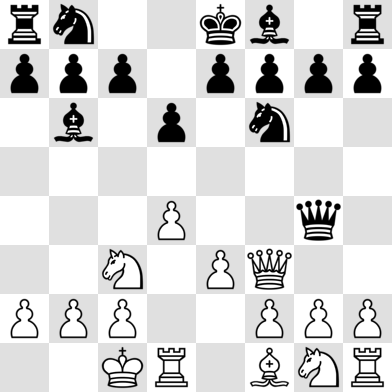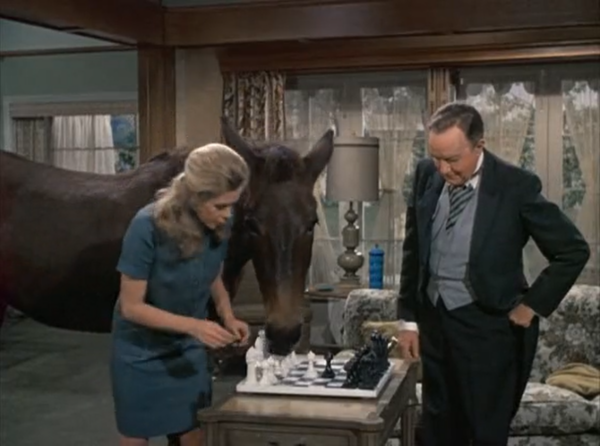Why is it that American television series tend to have billions of episodes? Take an iconic British series, say, Fawlty Towers: two seasons of six episodes each and that’s it. Take an iconic American series, like Bewitched: eight seasons with a total of over two hundred fifty episodes. Many theories have been put forth, but the obviously correct one has, as far as I’m aware, been overlooked. Clearly, it’s to improve the chances of a chess scene! Case in point, there’s no chess in Fawlty Towers, there is chess in Bewitched.
But a word or two about Bewitched. It’s about a witch who marries a standard issue, non-magical man, much to the chagrin of her family. In this particular episode, the witch’s father turns her husband into a mule.
The first thing of interest occurs when the woman living next door wants to complain to her husband about the sudden and unexpected presence of a mule in the neighbouring house.1 But while she’s busying herself with such trifles, she doesn’t even notice that he has set up the board wrongly. Or that he seems to have arrived in this position:2
 Admittedly, the reconstruction was fraught with difficulties: he’s using very odd pieces that are hard to tell apart. It is even possible that the actual position is not stupid, so I shan’t judge the directors on this.
Admittedly, the reconstruction was fraught with difficulties: he’s using very odd pieces that are hard to tell apart. It is even possible that the actual position is not stupid, so I shan’t judge the directors on this.
But not much later on, the eponymic daddy is playing a game of against the mule and this I will judge them on. Luckily, the mule’s chess is much more believable than the neighbour’s. He opens very sensibly with 1. e4 e5 2. Nf3. His opponent comments:
Maurice: Aha! The Ruy Lopez opening! A crafty little beast, aren’t you?
Oh, come on! There’s nothing crafty about playing the single most common opening ever3 — and this is too early to be a Ruy Lopez. In fact, after 2. … Nc6, white opts for 3. Nc3 instead.
And now, black comes up with a novelty not to be found in any theory book: Bg4! Brilliant! But illegal. And highly irresponsible. This is the kind of behaviour that led to witch hunts in medieval times.
Realism: 0/5 The first position is silly, but not illegal. However, it is based on little to nothing. And the second is bad enough to cancel out any points the first might have won.
Probable winner: Who knows? If they won’t abide by the rules of chess — and they don’t — all bets are off.
1. [The neighbouring house, indeed.] 
2. [When the wizards make chess diagrams, I bet they secretly just use this editor.] 
3. [Yes, I know that the Sicilian is more popular. But things were different in the sixties.]
